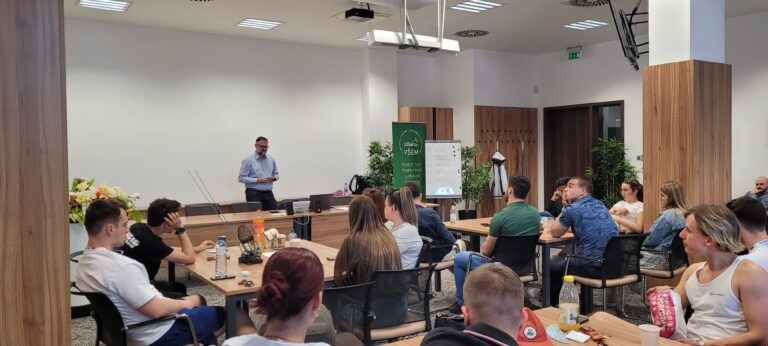On April 30th, 2024, the International Workshop of the project CSCE40 was held at the Bratislava University of Economics and Management (BUEM), focusing on the pilot application of innovations in youth education in the field of Circular Society in the Economy 4.0. The Norwegian Financial Mechanism supported the project under BIN SGS02_2021_011/82/22.
The workshop was divided into two parts. There were represented students from 3 EU countries - Poland, Croatia, and Slovenia, as well as university teachers and youth workers from Slovakia, Poland, and Croatia. The workshop started with a presentation by Prof. Dr. Robert Magda from John von Neumann University in Hungary with a focus on circular questions in our everyday life, followed by a case study on environmental aspects related to the current challenges in the field of the circular economy. Also, a theoretical background by a colleague from the Kingdom of Norway has presented not only the latest theoretical background but above all the results of many years of practice in applying practical aspects in youth education. The lecture was followed by a case study focused on showing best practices for solving environmental issues in practical life.
The afternoon session of the workshop was focused on explaining the role of project management in youth communities. The purpose of this combination was to motivate young learners to take an interest in their involvement in projects aimed at innovation in the field of the circular society or economy, also by highlighting selected examples of good practice. The workshop applied some of the sub-results of innovation in youth learning at the university level on the challenges of a circular society in Economy 4.0. In both workshop sections, considerable attention was paid to practical aspects and current methods for working with young people.
At a dynamic workshop focused on Circular Economy 4.0, a group of students was divided into four teams, each tasked with delving into the principles of Reuse, Recycle, Repurpose, and Refurbish. The teams were presented with a unique array of items to work with, sparking their creativity and problem-solving skills. Group 1 embarked on their journey with a diverse set of objects including a robot vacuum cleaner, a plastic bottle, a glass bottle, and a can. Group 2 received a Wi-Fi router alongside the items shared with Group 1, while Group 3 was challenged with an old-gen TV antenna in addition to the common items. Group 4, on the other hand, was tasked with exploring the potential of the charging station from Group 1's robot vacuum cleaner.
Adding a twist to the game, all teams were provided with an assortment of battery cells of different kinds. This element encouraged the students to not only consider how to repurpose or recycle the batteries but also to incorporate them creatively into their projects. The workshop fostered collaboration, critical thinking, and sustainability awareness as the teams brainstormed innovative ways to utilize the items at hand while emphasizing the importance of responsible waste management and resource conservation. By the end of the session, the students not only gained valuable insights into circular economy practices but also developed a deeper appreciation for the role they can play in building a more sustainable future.
